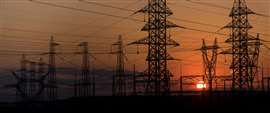Read this article in French German Italian Portuguese Spanish
Rental firms scramble to cope with Iberian grid collapse
07 May 2025
Last week a massive power outage left Spain, Portugal and parts of southern France without electricity. International Rental News editor, Lewis Tyler speaks to the rental companies affected and asks how the grid collapse is changing customer demand.
 Photo: Adobe Stock
Photo: Adobe Stock
At around 12:30 pm on April 28, a large-scale and unexpected power outage swept across Spain and Portugal following a major electrical system failure.
The disruption affected an estimated 60 million people. Parts of France and Andorra also experienced short-lived power disruptions, while reports of telecom instability extended as far as Morocco and Greenland.
In the hardest-hit areas of Spain and Portugal, significant chaos ensued, disrupting critical infrastructure and commercial activity.
While much of the initial focus was on rail networks, road transport, and retail operations, the impact on equipment rental companies and generator providers also revealed vulnerabilities in power preparedness.
The precise cause of the power outage remains unknown, although early analysis suggests a combination of factors related to grid stability and infrastructure limitations.
According to Spain’s grid operator, Red Eléctrica de España (REE), the incident began with two successive power losses at substations in southwestern Spain.
The grid withstood the first, but the second triggered a sudden 15-gigawatt drop in electricity generation, equivalent to around 60% of Spain’s total demand at the time, forcing automatic disconnections to protect equipment.
What is clear is that with both power and telecommunications down across much of the Iberian Peninsula, companies faced serious challenges related to communication, logistics and access at branch locations.
Rental response
One company affected was Kiloutou Spain, which told IRN that although the disruption was brief, it created logistical complications, particularly around depot access and internal coordination.
“We sent our teams home at the end of the morning of the blackout,” the company said. “One practical problem was that the branch gate was electric, so we had to use machines to block the access.”
With key systems offline, branches were unable to operate normally, although the situation improved as power began to return.
 Photo: Alayan
Photo: Alayan
For Alayan, which operates in both Spain and Portugal, the blackout also had an immediate and widespread effect. The most critical issue was the collapse of communications infrastructure.
“The blackout heavily affected operations,” the company told IRN. “The communication network collapsed and many mobiles and computers ran out of power. Considering how much we rely on these today, the impact was really big.”
With both voice and data networks impaired, the company was forced to find alternative ways to maintain communication and service continuity.
Some customers visited depots in person to collect equipment. In one case, a colleague located in the Canary Islands was able to reach clients still connected by mobile and relay messages to the main office via Teams and email.
Both companies confirmed that operations returned to normal within a day, in line with national restoration efforts.
Surge in genset demand
The blackout also triggered a spike in demand for generators, according to Alayan, particularly among small and medium-sized enterprises lacking backup systems.
The company highlighted a “massive” influx of requests for small- and mid-sized gensets in the hours following the outage, as businesses scrambled to maintain operations or prepare for possible future disruptions.
Spain-based generator manufacturer Himoinsa says that during the blackout it mobilised both its rental division and technical support to deliver emergency generators to affected areas.
However, Kiloutou reported that the overall commercial impact on generator rental and sales was limited by the short duration of the event.
Long-term effects
And, going forward, some rental companies say that the grid collapse has also heightened customer awareness about the need for preparation and backup systems.
Alayan said it expects to see growing demand in the months ahead for preventive maintenance, emergency service agreements, and better preparedness planning.
“[We expect] Probably more requests for emergency services and more preparation in terms of training, emergency protocols, and preventive maintenance,” the company noted.
Kiloutou, on the other hand, described the incident as a “black swan” event and does not anticipate major adjustments to its capital expenditure strategy unless similar disruptions become more frequent.
Energy resilience
 Photo: Himoinsa
Photo: Himoinsa
Himoinsa points out that only facilities equipped with uninterruptible power supplies (UPS) or standby generators were able to maintain operations throughout the blackout.
In critical sites such as hospitals and data centres, the combination of UPS and generator systems was essential to avoid service interruption.
Himoinsa argues that the incident serves as a stark reminder of how reliant modern infrastructure is on continuous electricity—and how unprepared many non-critical sectors remain.
Regulatory gaps and standards
Himoinsa also points to a lack of harmonised regulation regarding backup power systems across Europe. While countries such as France and the United States have national standards, the EU lacks a unified framework requiring backup generators in critical sectors.
Spanish law mandates emergency systems in “public occupancy facilities” but allows flexibility elsewhere. In light of recent events, Himoinsa suggests that this regulatory stance deserves reconsideration.
The blackout also affected all types of power generation, renewable, thermal, and nuclear. Automatic protection systems disconnected power plants from the grid to prevent damage, and many renewable assets like wind and solar farms were unable to function independently due to their reliance on grid synchronisation.
A wake-up call for Europe?
While most of the power was restored by Tuesday morning, the incident raised serious questions about the stability of Europe’s grid infrastructure and the readiness of businesses and public services for large-scale disruptions.
In response, the European Network of Transmission System Operators for Electricity (ENTSO-E), which represents 40 TSOs from 36 countries, has launched a formal investigation.
The inquiry will be led by independent experts and involve representatives from the affected TSOs (Red Eléctrica in Spain and REN in Portugal), as well as other European specialists.
It will reconstruct the sequence of events and deliver recommendations aimed at strengthening grid reliability across Europe.
A preliminary technical report is expected within six months.
STAY CONNECTED



Receive the information you need when you need it through our world-leading magazines, newsletters and daily briefings.
CONNECT WITH THE TEAM












